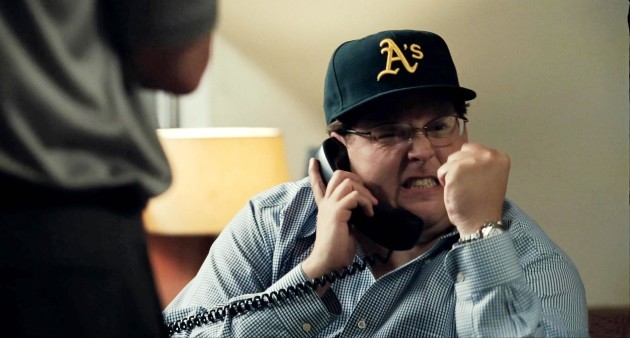(Photo: Warrick Page/HBO, via Los Angeles Times)
More and more this year, people have been tuning to the glamorized, sensationalized storytelling of semi-autobiographic depictions of real-life subjects that are based on true stories. Only that more TV networks decide to make wild exaggerations and some really bold choices that teeter the line of audacious storytelling that make for good television, and towards being absurdly unethical.
Case in point, exhibit A is where in Winning Time: The Rise of the Lakers Dynasty, Jason Clarke portrays Hall of Fame basketball player, and former coach and general manager Jerry West on the Showtime Lakers TV show. On the television show, Jerry West is portrayed as an angry, pessimistic, foul-mouthed individual, and it really leans into this persona for humorous purposes, although there are some touching moments where we get glimpses into his sadness and trauma due to his upbringing and failures to defeat the Boston Celtics as a player.
The real life person that is Jerry West and many of the actual former Los Angeles Lakers’ players and members were said to have very upset at the HBO’s portrayal of the fictionalized version of Jerry West, but HBO stood their ground, saying that it is a dramatization, which gives them the creativity and license to portray Jerry West to their liking.
Wood Harris gave a riveting, nuanced complex portrayal of the beleaguered Spencer Haywood, whose tortured mind state and battles with drug addiction come to a head during the 1980 NBA Finals on HBO's hit TV show, Winning Time.(Photo: HBO, via MEAWW)
Wood Harris gave Spencer Haywood a nuanced portrayal of a hardened, veteran basketball player that has dealt with having fought the judicial system and NBA front offices’ retaliation of allowing high school players to enter the league, as well as dealing with drug addiction. One particular end to an episode was rather shocking, as the fictionalized version of Haywood threatened the Lakers right after they dismissed him from their team during the NBA Finals, but the actual version of Spencer Haywood was said to be okay with the TV show portrayal, and was said to have liked Wood Harris’ portrayal of him, so all is well in that regards.
Rachel Deloache Williams (on the left) is portrayed on Inventing Anna by Katie Lowes (on the right), and Rachel Deloache Williams was less than pleased with her portrayal on Netflix's TV show.(Photo: Getty Images/Netflix, via BBC)
Now, in exhibit B, Vanity Fair’s editor and writer Rachel Deloache Williams wrote a book called, “My Friend Anna: The True Story of a Fake Heiress,” which was about her having been friends with Anna Sorokin, who had pretended to be an heiress named Anna Delvey, and then sold the rights to HBO, and it inspired Netflix to create a hit TV show, “Inventing Anna,” which was created by Shonda Rhimes.
Unfortunately, while Inventing Anna has become popular, and has notable actors such as Veep’s Anna Chlumsky, Inventing Anna had somehow used Rachel Deloache Williams’ material, and it was said that it had spun it around to portray Rachel Deloache Williams in an unfavorable light, as it may have done so dishonestly. Nevertheless, it seems that creator Shonda Rhimes made a rather curious choice to paint Rachel Deloache Williams this way, which has now paved way to Rachel Deloache Williams’ lawsuit as she is suing both Netflix and Inventing Anna for taking too many liberties and for their purportedly malicious, dishonest, and false portrayal of her. (That is between them, that's all I'll have to say about that.)
I’m well aware that Jerry West is a Hall of Fame basketball player that won with the Lakers as a player, and he also won as a general manager of the Lakers. But I don’t know Jerry West as a person, and I don’t personally know anyone that was involved with the Netflix TV show. Therefore, since I don’t have firsthand knowledge of how things went behind the scenes, that’s between them.
TV networks easily can say that it’s based on a true story or that it is for dramatization. But there’s a line between audacious storytelling, and going too far and crossing over to the point where it’s unethical. Inventing Anna definitely seems like the latter, where it uses material from Rachel Deloache Williams’ book, and then the show makes it seem like she’s just as bad as Anna was or worse.
TV networks have millions and billions of dollars, and they can easily take a real life person and materials from them and paint them in a negative way without their permission, and be able to win court cases because they have an endless pit of money, and they can afford the most expensive lawyers. Still, I feel like it would be better if they were to take a more ethical approach instead. It feels weird that Rachel Deloache Williams was a victim of Anna’s scheme, and Netflix chose to paint Rachel in a negative light anyways. That seems like gas-lighting. Instead, if they were to choose to do that for storytelling purposes, maybe they should’ve not used her name, and come up with an amalgam character instead, like maybe have the character be named Francesca Billingsley, or something.
As for the HBO show Winning Time, I feel very conflicted about Jerry West’s portrayal on the show. On one hand, it was comedic and the fictionalized portrayal of West’s extremely vulgar and over-the-top sensibilities made him both humorous and edgy, which keeps viewers like myself on their toes. I feel like their portrayal of him was both fun and also kind of unethical, but their unauthorized biography and fanciful portrayal of Jerry West is a rather fun one, albeit also over the top.
On the other hand, if he wasn’t vulgar or this angry or pessimistic in real life, then it feels like an exaggerated, slightly dishonest portrayal that was just done to humor me at the expense of the real life Jerry West. I must say, Winning Time is kind of a guilty pleasure type of show, but I do understand why real life Lakers people that lived the Showtime era would be extremely upset at HBO’s portrayal of Jerry West on the show.
Jonah Hill plays the likable and intelligent, but at times socially inept intellectual named Peter Brand that manages to become the assistant GM of a Major League baseball team, the Oakland A's in the hit movie, Moneyball.At least with Moneyball, when Paul DePodesta didn’t want involvement or have his name in the movie when they chose to hire Jonah Hill over Demetri Martin (both very good actors), they at least accommodated his request, and they had Jonah Hill play an amalgam character named Peter Brand. That way, creating a fictitious, amalgam character can give actors the license to freely play their character without the worry of harming the actual person that lived this role in real life.
There has to be a happy medium between a sanitized version of real life events, and absurdly, dishonest and extremely exaggerated portrayals of that. A sanitized version of real life events feel dishonest in a completely different way, as that would be as if they are trying to clean up and tidy events or portray bad events as if they had never happened.
Most television viewers don't want ham-fisted, overly sanitized autobiographies. They want and crave the juicy stuff, the tidbits people want to hide away from the public, which is why Winning Time exists, to satiate those desires for people. At the same time, the stories we are telling are about real people, or are at least dramatized versions of that, which may come awfully close to crossing the line, if it doesn't quite do so. But some TV networks may opt to tell a story in such an overly sensationalized way that it may stray too far from the truth or may make up events altogether, and put it neatly under the umbrella of "dramatization," a creative license that allows them to fictionalize certain or whole events altogether while portraying their story as "based on a true story."
In the future, if real life people would like their stuff to be made by movies and TV shows, then they ought to make sure that they instill clauses that give them oversight and the right to refuse how a character portrayal of them would come across on the big screen. Otherwise, without such clauses, this may give TV networks free reign to paint people as positively, negatively, or as vulgar and absurd as they want to paint them, which could come at some people’s expense.
Of the TV shows I have mentioned, I have not seen Inventing Anna, nor do I have plans to. I have seen Winning Time: The Rise of the Lakers Dynasty, and if you are willing to overlook the absurdities and vulgarities and take it in stride and just know you are watching a show that is full of comedy, drama, and action, then you may be in for a treat. I'd say Winning Time was a solid (if not perfect) TV show. Yes, some of the portrayals are absurd, outlandish, and over the top, but they go really in depth with some of the characters, and they do know how tell and weave a good story. I'd even go so far as to say it's worth a watch.
That said, TV networks should have a crumb of a responsibility to tell their stories as honestly and accurately as possible. If they don't feel obligated or tethered to real-life subjects themselves, they at least owe it to the viewers to tell the stories to make sure that it closely mirrors real life.



